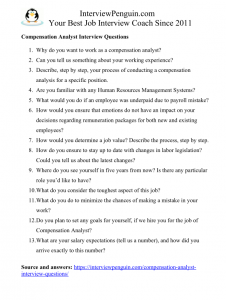Forget the talk about great working environment, meaningful purpose of work, excellent team, or other reasons why people decide for a job offer. Money talks, and it always will. Everything else is of secondary importance (though still important).
Unless a company offers competitive remuneration packages to their new employees, and to their best performing players, they will leave and accept a better offer somewhere else.
As a compensation analyst your job will be to ensure that people are properly compensated in the company, that they are at least somehow satisfied with the level of salaries and with the employee benefits.
You will also develop remuneration packages for new positions, following the market trends, spying on competition, and trying to find the right balance between candidates’ expectations and the sum of money executives are willing to spend each month on salaries.
Let’s have a look at some questions you will face while interviewing for this interesting position.
Table of Contents
Why do you want to work as a compensation analyst?
You can talk about your excellent analytical skills and attention to detail. You understand the crucial role proper compensation plays in each and every business, and found the job interesting. What’s more, you have outstanding people skills, and your emotions don’t have an impact on you in work, and you have experience in HR.
Basically explain them that after reading the job description, and thinking carefully about your strengths and skills, you found a perfect match in a job of a compensation analyst. What’s more, you enjoy analyzing data and working with both people and numbers, and are eager to start.
Can you tell us something about your working experience?
You likely worked as an HR Generalist, or had other entry level job in HR or in financial analysis. Explain them your duties, and focus on things that will help you in your new job. For example if you negotiated salary raise with employees, or responded for payroll, you learned employee expectations and how to deal with different people in work.
Maybe you participated in job interviews, and led salary negotiations (or at least heard them), which is again a big plus for your new job.
They should get an impression that your career path makes sense, that you are ready to work as a compensation analyst (after everything you’ve done up to this point) and perhaps also know where you want to progress from there, in few years time (HR Manager, Compensation Manager).
Describe, step by step, your process of conducting a compensation analysis for a specific position.
You should always start with clearly defining the job–the duties, working hours, name of the position, purpose of the work, required skills and experience, and so on. At the end you should have a job description ready.
Second step is using salary surveys information (from both within the company and on a local and nationwide level), and trying to find how much do people with similar jobs earn. You may find an exact match and if you do not, blend more data together and make an average.
Third step is determining the job value for your organization. It may happen that certain job is more valuable for your organization than other jobs (or more valuable than it is for other organizations), and in such a case you should consider better compensation, to ensure you’d attract the best possible applicants.
The last step is comparing the results of your analysis and suggested salary with the budget allocated for the position, and factor in bonuses and other increases. You should also consider the mix of pay, such as fixed and variable pay, if applicable for the position.
* This was just a basic description of a compensation analysis. If you need more information, you can check this post on ERC website.
Are you familiar with any Human Resources Management Systems?
There are many great HR Information Systems. They may not necessarily use the one you worked with in your last job. Ensure them that you are a quick learner, and knowing the common modules of any HRIS, you will surely get around the software they use in their company, be it Zenefits, Workday HCM, BambooHR, or enterprise solution from Oracle.
You can also talk about other computer programs you have experience with, such as MS Office (Excel in particular), or any software for data analysis. You won’t get far in this job without using software products…
What would you do if an employee was underpaid due to payroll mistake?
Payroll mistake is not the mistake of an employee in question. Suggesting compensating them later (adding the difference to next month’s payroll) will easily cost you your job application.
Say that you will pay all wages due as soon as the mistake was discovered. Employees represent the greatest asset of each and every company. There would be no great companies without great people… You are well aware of the fact, and will do whatever possible within the scope of your responsibilities to make the employees satisfied, and to compensate them properly.
Special Tip: You can download the list of all questions in a one page long PDF, print it, and practice your interview answers anytime later:

How would you ensure that emotions do not have an impact on your decisions regarding remuneration packages for both new and existing employees?
We are people. We have emotions. When you re-evaluate a remuneration package of a good friend (who happens to work in the same company), you may have a tendency to make it at least slightly better for them. Why won’t you? You are friends, and they are doing a great job for the company. Or is it not right?
It isn’t right. Ensure the interviewers that emotions won’t interfere with your work. You will set clear criteria, clear processes and steps for each compensation analysis. This may include the performance of the employee in previous period, but also their performance will be evaluated solely with the help of numbers and data, and your emotions won’t have any place in the calculations.
You will simply have the same criteria for everyone, and instead of working with names you’ll work with data, and therefor emotions should not have any impact on your decisions in work.
Other questions you may face in your compensation analyst job interview
- How would you determine a job value? Describe the process, step by step.
- How do you ensure to stay up to date with changes in labor legislation? Could you tell us about the latest changes?
- Where do you see yourself in five years from now? Is there any particular role you’d like to have?
- What do you consider the toughest aspect of this job?
- What do you do to minimize the chances of making a mistake in your work?
- Do you plan to set any goals for yourself, if we hire you for the job of Compensation Analyst?
- What are your salary expectations (tell us a number), and how did you arrive exactly to this number?
Conclusion, next steps
Interview for a job of a Compensation Analyst belongs to interviews with average difficulty. You typically won’t compete with many other people for the position (this isn’t a fancy job title), which makes your situation easier.
On the other hand, they will typically ask you at least few technical questions (about conducting compensation analysis, determining job value, addressing gender gap pay, and similar), and it may be difficult for you to answer these questions without previous experience in the field…
Spend enough time preparing for your interview. Check various sources, prepare a short answer to each questions from this article, and do not forget to polish your knowledge of compensation analysis. Last but not least, success (or failure) in an interview isn’t only about your interview answers. Check also the following articles to continue your preparation for the big day:
- HR Generalist interview questions.
- Talent Sourcing Specialist interview questions.
- Attention to detail interview questions – You may get a few of these in your compensation analyst interview. Learn how to handle them.

